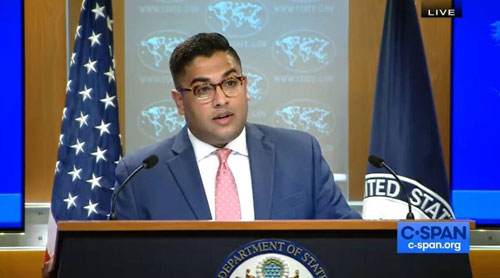Rains & aftermath-nature’s fury compounded by human errors
UNPRECEDENTED rains in Pakistan this year have resulted in a disaster of highest magnitude and misery unmatched in decades.
Climate changes and eco-environments shifting have been expected for a long time throughout our entire globe.
In some regions the changes are mild and in some, very harsh. While the rest of the world (particularly West) started preparing for these changes years ago and put necessary policy frame work in place and also launched a media campaign to spread awareness for the imminent catastrophe which is going to engulf the entire earth.
But unfortunately, as usual, our leaders and state machinery never took the threat seriously and remained un-prepared for the big dilemma, heading our way.
The government preferred staying ignorant of the reality and whatever planning was done, if any, it stayed on the papers only and nothing tangible and practical was done.
The result is now before us. Thousands of people have died in the floods and millions uprooted from their homes and living under open sky and are starving.
But it is heartening that public response on an individual and collective basis has been immense.
At least humanity still exists and compassion is still alive. Human-induced climate change is causing dangerous and widespread disruption in nature and affecting the lives of billions of people around the world, despite efforts to reduce the risks.
People and ecosystems least able to cope are being hardest hit, according to the latest Intergovernmental Panel on Climate Change (IPCC) report.
“This report is a dire warning about the consequences of inaction,” said Hoesung Lee, Chair of the IPCC.
“It shows that climate change is a grave and mounting threat to our wellbeing and a healthy planet.
Our actions today will shape how people and nature responds to increasing climate risks.
” The world faces unavoidable multiple climate hazards over the next two decades with global warming of 1.5°C (2.7°F).
Even temporarily exceeding this warming level will result in additional severe impacts, some of which will be irreversible.
Risks for society will increase, including to infrastructure and low-lying coastal settlements.
Increased heat-waves, droughts and floods are already exceeding plants and animals’ tolerance thresholds, driving mass mortalities in species such as trees and corals.
These weather extremes are occurring simultaneously, causing cascading impact which is increasingly difficult to manage.
They have exposed millions of people to acute food and water insecurity, especially in Africa, Asia, Central and South America, on Small Islands and in the Arctic.
To avoid mounting loss of life, biodiversity and infrastructure, ambitious, accelerated action is required to adapt to climate change, at the same time as making rapid, deep cuts in greenhouse gas emissions.
So far, progress on adaptation is uneven and there are increasing gaps between action taken and what is needed to deal with the increasing risks, the new report finds.
These gaps are largest among lower-income populations. With fact upon fact, this report, which focuses on impacts, adaptation and vulnerability, reveals how people, and the planet, are getting “clobbered” by climate change, said UN Secretary General in a recorded message.
“Nearly half of humanity is living in the danger zone – now.Many ecosystems are at the point of no return – now.
Unchecked carbon pollution is forcing the world’s most vulnerable on a frog march to destruction – now”, he said.
The report identified 127 risks, covering a very wide range of sectors, like health, agriculture, economy, infrastructure, and ecosystems.
More than 4 in 10 people in the world live in contexts highly vulnerable to climate change. Global hotspots are found in parts of Africa, Southern Asia. In many of those countries, population growth, urbanization and unsustainable development practices are boosting the exposure of people and ecosystems to climate change.
But all countries are affected, as we have seen in Germany, USA and Canada last year. Humanity has spent centuries treating nature like its worst enemy.
The truth is that nature can be our savoir – but only if we save it first. There are options to adapt to a changing climate.
This latest report provides new insights into nature’s potential not only to reduce climate risks but also to improve people’s lives.
“Healthy ecosystems are more resilient to climate change and provide life-critical services such as food and clean water”, said IPCC Working Group II Co-Chair Hans-Otto Pörtner.
“By restoring degraded ecosystems and effectively and equitably conserving 30 to 50 per cent of Earth’s land, fresh water and ocean habitats, society can benefit from nature’s capacity to absorb and store carbon, and we can accelerate progress towards sustainable development, but adequate finance and political support are essential.”
Scientists point out that climate change interacts with global trends such as unsustainable use of natural resources, growing urbanization, social inequalities, losses and damages from extreme events and a pandemic, jeopardizing future development.
“Our assessment clearly shows that tackling all these different challenges involves everyone – governments, the private sector, civil society – working together to prioritize risk reduction as well as equity and justice in decision-making and investment”, said IPCC Working Group II Co-Chair Debra Roberts.
“In this way, different interests, values and world views can be reconciled. By bringing together scientific and technological know-how as well as indigenous and local knowledge, solutions will be more effective.
Failure to achieve climate resilient and sustainable development will result in a sub-optimal future for people and nature”, she said.
This report provides a detailed assessment of climate change impact, risks and adaptation in cities, where more than half the world’s population lives.
People’s health, lives and livelihoods, as well as property and critical infrastructure, including energy and transportation systems, are being increasingly adversely affected by hazards from heat-waves, storms, droughts and floodings as well as slow-onset changes, including sea level rise.
Together, growing urbanization and climate change create complex risks, especially for those cities that already experience poorly-planned urban growth, high levels of poverty and unemployment, and a lack of basic scientific evidence is unequivocal: climate change is a threat to human wellbeing and the health of the planet.
Any further delay in concerted global action will miss a brief and rapidly closing window to secure a liveable future. Collective actions at local, regional and international level are the need of the hour.
—The writer is on the panel of Migration Policy Institute, Washington and Migration Source, Europe, presently living in US.










